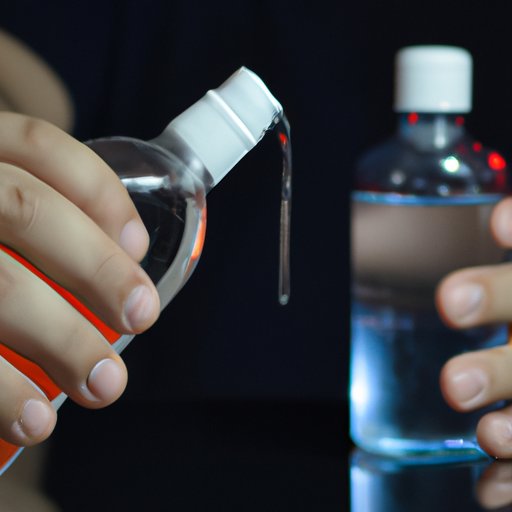
Introduction
It’s unfortunately not uncommon for people to resort to drinking mouthwash in order to get drunk, with the alcohol content being the appeal. With many popular mouthwash brands containing a high amount of alcohol, it’s not surprising that people may consider using it as an alternative to alcohol. However, the reality is much darker, with dire long-term health implications. This article aims to raise awareness about the dangers of consuming mouthwash containing alcohol, highlighting the risks and potential health damage.
It is Possible to Get Drunk off Mouthwash
Mouthwash can contain a high level of alcohol, making it possible to achieve a level of intoxication. Some mouthwashes contain up to 25% alcohol, which is comparable to a glass of wine. While the amount of alcohol present may vary depending on the brand, drinking a significant amount of mouthwash can raise your Blood Alcohol Concentration (BAC) to a level that can cause impairment, making it dangerous to operate a vehicle or perform basic functions.
Drinking Mouthwash for a Buzz – Why It’s a Bad Idea
While it’s possible to get a buzz by consuming mouthwash, it’s definitely not recommended. For one thing, mouthwash is not intended to be consumed in large quantities, so it can be difficult to gauge how much alcohol you’re ingesting. Prolonged excessive use of mouthwash can damage the liver and brain significantly and even cause blindness. In some cases, it might even lead to respiratory problems or even death. Some symptoms of mouthwash poisoning include dizziness, headaches, and nausea.
The Dangerous Effects of Consuming Mouthwash Excessively
Mouthwash contains other chemicals besides alcohol, such as fluoride and hydrogen peroxide, which might be toxic in large amounts. Drinking excessive mouthwash can cause gastrointestinal problems and potentially damage the central nervous system. Since it takes longer for the body to process the alcohol found in mouthwash than it would if you were drinking alcohol, it’s possible to consume a hazardous amount without realizing it. Excessive ingestion of mouthwash can also lead to alcohol poisoning, which can ultimately be deadly. Symptoms of alcohol poisoning include confusion, seizures, and vomiting, among others.
Can Drinking Mouthwash Lead to Alcoholism?
Addiction can form through repeated consumption of mouthwash as a source of alcohol. Since mouthwash is readily accessible and often used for non-drinking purposes, it may seem like a harmless way of getting drunk. Unfortunately, this is not the case, as addiction can form rather quickly and is a serious issue that can take a mental toll on an individual and their loved ones. Addiction can be challenging to overcome, and seeking necessary help from a professional is paramount.
Alternatives to Using Mouthwash as a Source of Alcohol
Instead of using mouthwash to achieve a buzz, individuals must seek non-alcoholic alternatives, such as sodas, juice, or mocktails. These alternatives are much safer, and they don’t contain toxic substances. Another option is to seek help for addiction if necessary.
Understanding Risks Associated with Consuming Mouthwash containing Alcohol
It’s time to highlight how harmful consuming mouthwash containing alcohol can be. It’s essential to raise awareness about the potential dangers of drinking it, such as poisoning and addiction. In summary, it is best to keep in mind the fact that mouthwash was not intended for consumption, but rather as a measure of oral hygiene. If the excessive drinking of mouthwash is witnessed or anyone shows signs of addiction and excessive consumption of mouthwash containing alcohol, it is advisable to get them to seek professional help. Prioritizing safety measures and keeping an eye on one’s habits can prevent long-term health consequences.
Conclusion
Drinking mouthwash to get drunk may seem like an easy solution to a short-term problem. However, the consequences of this behavior can be devastating and have long-term implications for health, both physically and mentally. By educating individuals about the dangers of drinking mouthwash, encouraging non-alcoholic alternatives, and highlighting the potential for addiction, we can help people make informed and healthy choices. Seek professional help if necessary and prioritize mindful conclusions to prevent and avoid long-term health implications.





